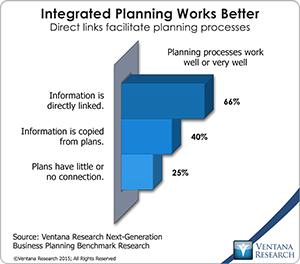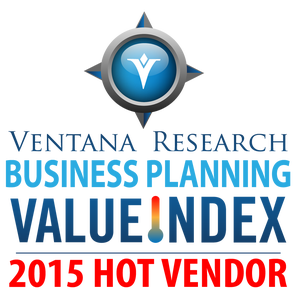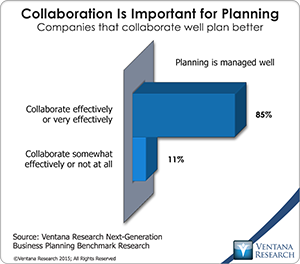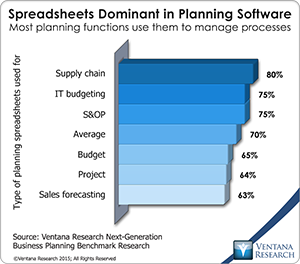Tidemark Systems offers a suite of business planning applications that enable corporations to plan more effectively. The software facilitates rapid creation and frequent updating of integrated company plans by making it easy for individual business functions to create their own plans while allowing headquarters to connect them to create a unified view. I coined the term “integrated business planning” a decade ago to highlight the potential for technology to substantially improve the effectiveness of planning and budgeting in corporations, and it remains true that integrating business planning can produce superior results. Companies that maintain direct links between functional or departmental plans more often have a planning process that works well than others. Our next-generation business planning benchmark research shows that two-thirds (66%) of those that maintain such links have a planning process that works well or very well, compared to 40 percent that copy information from individual plans into an overall plan and just 25 percent in which plans have little or no connection.
Businesses commonly do a lot of planning within individual silos: There are sales plans, marketing plans, manufacturing plans, R&D plans and various others. However, in most companies the only unified plan is the corporate budget, which is a financial plan used mainly for allocating resources and controlling spending. Because they are focused almost exclusively on monetary consequences, budgets are not especially useful for planning the operations of a company, which requires attention to the things of a business (such as head count, numbers of purchased parts and tons of materials).
Tidemark has made significant progress with its software that I have previously assessed with how it unifies business planning and the company’s Fall 2015 release includes a new feature, Tidemark Complete, that enables companies to benchmark their performance against that of competitors. In almost all organizations, performance reviews compare results against the current plan or the previous quarter or year. While this is essential, it’s insufficient because business is not an “us-vs.-us” game; it’s an us-vs.-them competition. Even so, most companies don’t assess their results against the market because they find it too difficult and time-consuming to assemble the data. Tidemark Complete addresses this issue. The latest release also adds packaged configurations and metrics tailored for the insurance, hospitality and retail industries that enable such companies to accelerate their implementation of Tidemark. In the Spring 2015 release the company introduced packages for higher education and subscription commerce. The subscription commerce app is especially useful for companies with recurring revenue businesses for two reasons. One is that managing these types of businesses requires using metrics that are not directly available from the accounting process. These include the annual recurring revenue (ARR) and annual and total contract value (ACV and TCV). Typically, the finance staff assembles data from one or more sources in desktop spreadsheets to do the calculations, analyze the results and create reports. As well as time-consuming, this method is prone to errors and incompleteness in the data. The second reason is that revenue recognition in subscription businesses is often complex. For planning purposes, it’s useful to be able to automate the translation of booking events into reported revenue because it saves time and results in more accurate projections of future financial statements.
Ventana Research rated Tidemark a Hot Vendor in our 2015 Business Planning Value Index. Tidemark’s software offers all of the capabilities necessary to support state-of-the-art planning. That is, it offers engaging visualization and reporting functionality that enhances understanding and insight in developing plans as well as communicating results. It has workflows to manage plan creation and periodic updates that cut the time and effort required to supervise the process and thus shorten planning cycles. It offers  integrated analytics to support the planning and review phases of the process as well as Storylines and Playbooks, methods that present an organization’s performance in narrative form with engaging data visualizations. An important reason why companies invest time in creating plans is to set objectives so they can periodically review their performance to those objectives. By organizing all business planning on a single platform, Tidemark allows each planning unit to review its results faster and headquarters to review the overall financial and operational performance sooner. Our research finds that companies that use a dedicated third-party planning application such as Tidemark are more able to uncover details during a review meeting because they can drill down to uncover underlying details while the meeting is under way. This enables managers and executives to get to information that can promote agility and provides an environment that encourages action in the whole organization.
integrated analytics to support the planning and review phases of the process as well as Storylines and Playbooks, methods that present an organization’s performance in narrative form with engaging data visualizations. An important reason why companies invest time in creating plans is to set objectives so they can periodically review their performance to those objectives. By organizing all business planning on a single platform, Tidemark allows each planning unit to review its results faster and headquarters to review the overall financial and operational performance sooner. Our research finds that companies that use a dedicated third-party planning application such as Tidemark are more able to uncover details during a review meeting because they can drill down to uncover underlying details while the meeting is under way. This enables managers and executives to get to information that can promote agility and provides an environment that encourages action in the whole organization.
Tidemark also offers built-in social collaboration capabilities in context. Collaboration is essential in the process of planning in corporations because it helps ensure that activities are coordinated. Companies have multiple objectives for their planning processes. Chief among these is accuracy. But since things don’t always go to plan, companies need agility in responding to changes in a timely and coordinated fashion, and collaboration facilitates this also. In a small business, planning can be informal because of the ease of communications between all members and the ease with which plans can be modified in response to changing conditions. In larger organizations the planning process becomes increasingly difficult because communications become compartmentalized locally and diffused across the enterprise. Facilitating collaboration across geographies or business silos addresses the communications issues. Tidemark’s  collaboration capabilities address this issue more readily and completely than email or instant messaging. Setting and changing the company’s course require coordination to ensure that the actions of one part of the organization complement (or at least don’t impede) the actions of others. Better communication across the organization promotes coordination because it enables better understanding of the impact of policies and actions in one part of the company on the rest of it. Yet only 14 percent of companies are able to accurately measure that impact, and fewer than half (47%) have even a general idea. Integrated business planning coupled with a collaboration capabilities addresses that issue.
collaboration capabilities address this issue more readily and completely than email or instant messaging. Setting and changing the company’s course require coordination to ensure that the actions of one part of the organization complement (or at least don’t impede) the actions of others. Better communication across the organization promotes coordination because it enables better understanding of the impact of policies and actions in one part of the company on the rest of it. Yet only 14 percent of companies are able to accurately measure that impact, and fewer than half (47%) have even a general idea. Integrated business planning coupled with a collaboration capabilities addresses that issue.
Using the most capable technology also helps. Using limited tools is a major barrier preventing companies from integrating their planning efforts; spreadsheets in particular are a major  culprit. Our research reveals that across the spectrum of corporate planning activities, seven out of 10 organizations use spreadsheets to manage their planning processes. Tidemark’s common planning platform for individual departmental and functional plans, plus built-in analytics and reporting and its focus on ease of use, provides a compelling reason to switch from spreadsheets. Also, compared to using spreadsheets, Tidemark’s applications can make the planning process far more interactive by utilizing in-memory processing to speed calculations. When even complex planning models with large data sets can be run in seconds or less, senior executives and managers can quickly assess the impact of alternative courses of action in terms of their impacts on key operating metrics, not just revenue and income. Furthermore, having the means to engage in a structured conversation with direct reports can help executives implement strategy and manage their organization more effectively.
culprit. Our research reveals that across the spectrum of corporate planning activities, seven out of 10 organizations use spreadsheets to manage their planning processes. Tidemark’s common planning platform for individual departmental and functional plans, plus built-in analytics and reporting and its focus on ease of use, provides a compelling reason to switch from spreadsheets. Also, compared to using spreadsheets, Tidemark’s applications can make the planning process far more interactive by utilizing in-memory processing to speed calculations. When even complex planning models with large data sets can be run in seconds or less, senior executives and managers can quickly assess the impact of alternative courses of action in terms of their impacts on key operating metrics, not just revenue and income. Furthermore, having the means to engage in a structured conversation with direct reports can help executives implement strategy and manage their organization more effectively.
Integrated business planning applications are changing the conversation from a finance-centric approach to one that supports planning operations and finance in parallel. Companies that are dissatisfied with their current approach to business planning and are looking to improve important aspects of it including accuracy, insight, speed and alignment should consider dedicated business planning tools. When they do that, they should consider the kind of software that will enable them to support a better process. We recommend that they include Tidemark in their evaluation.
Regards,
Robert Kugel – SVP Research














